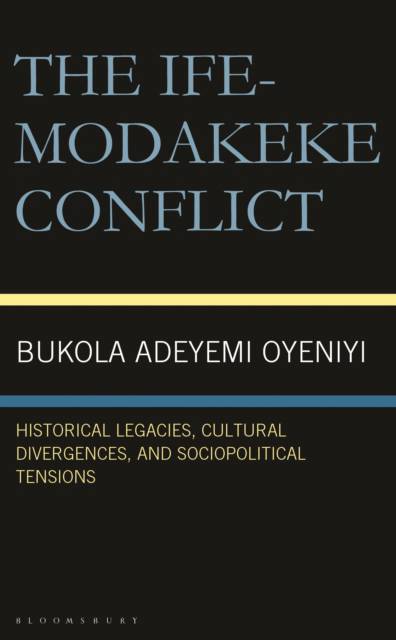
- Afhalen na 1 uur in een winkel met voorraad
- Gratis thuislevering in België vanaf € 30
- Ruim aanbod met 7 miljoen producten
- Afhalen na 1 uur in een winkel met voorraad
- Gratis thuislevering in België vanaf € 30
- Ruim aanbod met 7 miljoen producten
Zoeken
The Ife-Modakeke Conflict
Historical Legacies, Cultural Divergences, and Sociopolitical Tensions
Bukola Adeyemi Oyeniyi
Hardcover | Engels
€ 186,95
+ 373 punten
Omschrijving
Bukola Adeyemi Oyeniyi examines the complex interplay of history, culture, and politics that have shaped the longstanding conflict between the Ife and Modakeke communities in Nigeria.
This book argues that the roots of this conflict extend beyond immediate sociopolitical grievances and are deeply entwined with historical legacies and cultural divergences that have evolved over centuries. Using archival materials, oral histories, and contemporary narratives, Oyeniyi illustrates how colonial legacies, ethnic identities, and local power dynamics have contributed to ongoing tensions. The analysis reveals how historical grievances are often reframed in contemporary contexts, influencing community relations and political alignments. Ultimately, this book sheds light on the necessity of understanding historical contexts to address current conflicts, offering insights into conflict resolution and peacebuilding strategies that are informed by a nuanced grasp of local histories and cultural identities. This book contributes significantly to the broader discourse on conflict in Nigeria and Africa, emphasizing the importance of historical awareness in contemporary sociopolitical landscapes.Specificaties
Betrokkenen
- Auteur(s):
- Uitgeverij:
Inhoud
- Aantal bladzijden:
- 248
- Taal:
- Engels
Eigenschappen
- Productcode (EAN):
- 9781666971156
- Verschijningsdatum:
- 4/09/2025
- Uitvoering:
- Hardcover
- Formaat:
- Genaaid
- Afmetingen:
- 152 mm x 229 mm
- Gewicht:
- 498 g

Alleen bij Standaard Boekhandel
+ 373 punten op je klantenkaart van Standaard Boekhandel
Beoordelingen
We publiceren alleen reviews die voldoen aan de voorwaarden voor reviews. Bekijk onze voorwaarden voor reviews.







